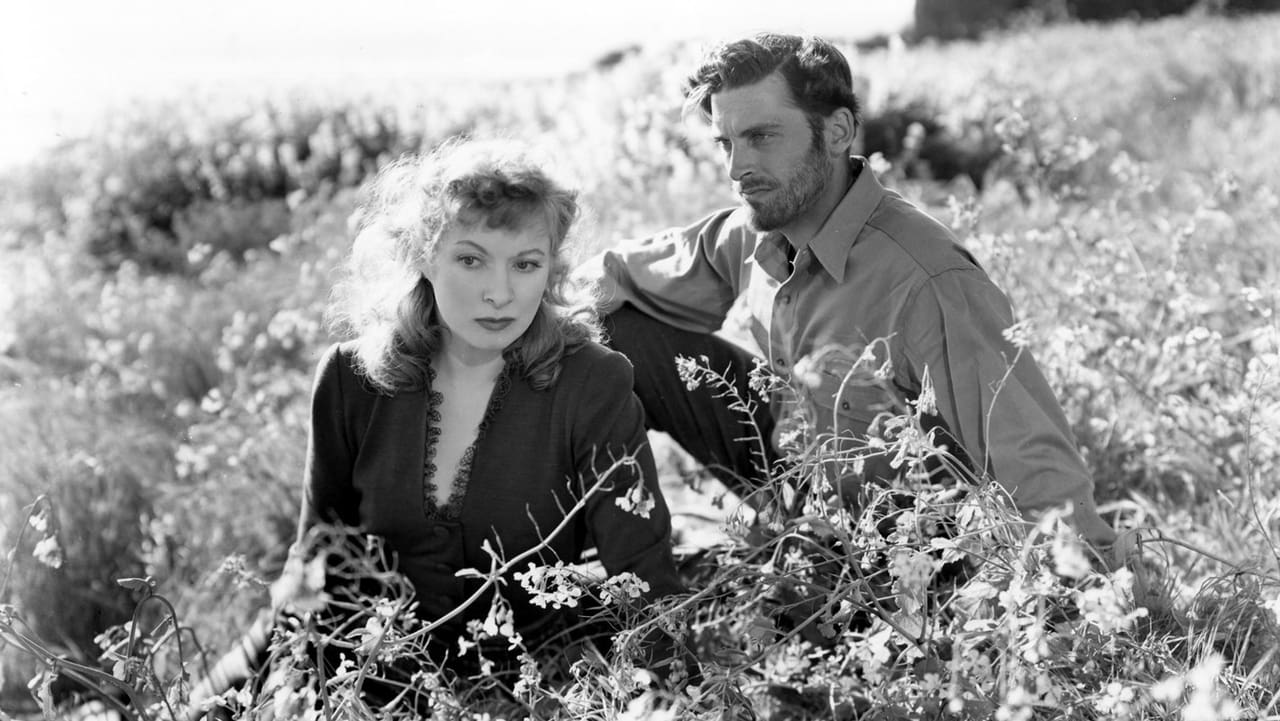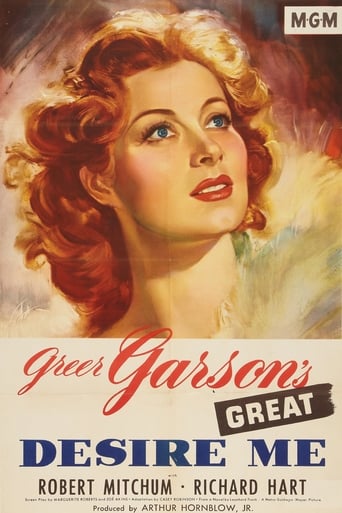

I will give three reasons to watch this movie. First reason-an interesting story about a man returning from the war and trying to take over his dead friend's wife and life! Second reason-excellent acting by the entire cast of Greer Garson, Richard Hart, Robert Mitchum, George Zucco, Morris Ankrum, and Cecil Humphreys! Third reason- Richard Hart! He died young, and he did not make too many movies. This movie might be one of your best chances to see his acting, as I do not think he had such a big role in another movie, and he was excellent in this movie. In fact, on the basis of this movie, I am surprised he did not become an even bigger name in motion pictures!
... View MoreWhen film critics rate the best actors they fail to realize that the quality of film making has (in many cases) improved as time passes. Modern actors are far superior, on the whole, to those from the 40's and 50's. Perhaps casting personnel didn't have many actors who could fake a foreign accent back then.Greer Garson (a Frenchwoman) is English. Robert Mitchum and Richard Hart (Frenchmen) are American. That is apparent by their accents. If Gary Oldman, Dustin Hoffman or Robin Williams had been available.... (forget it - they would have been mis-cast). Couldn't they have cast French film stars? I'm a male Vietnam veteran who can appreciate a good love story, but this is soap opera tripe. Perhaps I've been hardened by dodging Molotov cocktails while working in a Stars and Stripes office in Saigon.I'm also a businessman and I was hoping we would learn that Paul got his fishing business back. If he wasn't really dead it all depends upon French law. With that in mind, one can easily see how seriously I took the film.
... View MoreThis film is an atrocious failure on many levels.It is emblematic of the loss of imagination and the draining of talent of the studio system in the late forties when confronted with the genius of European productions of the same time, especially Italian neo-realism.To begin with, the subject is extremely derivative. It is based on a German play that had already been made into a successful film in 1928 in Germany. This play was inspired, like a whole family of plays and films of the era, by a real event that took place in Italy in the 20's (the Bruneri-Canella case). This case also inspired the 1938 French film "Carrefour" (set in France and remade in Hollywood as "Crossroads"). This French film was later remade in England in 1940 as "Dead Man's Shoes". The same story inspired Pirandello's "As You Desire Me", set in Italy, in the late 20's, which became a Greta Garbo vehicle in the 30's, as well as the novel "The Wife of Martin Guerre" by American writer Janet Lewis (1941), a story set in France in the Middle Ages, which became the French film "The Return of Martin Guerre" (Daniel Vigne, 1982), which was of course remade as a Hollywood film starring Richard Gere, "Sommersby" (Jon Amiel, 1993) and set after the US Civil War. The same Italian story also inspired Edward Wool's 1935 play "Libel!" (filmed in 1959 in England), which has several similarities with the classic film "Random Harvest" (1942).As if the story was not tired enough, the big mistake was to transpose a German play about the aftermath of the First World War in a post-WWII French Brittany setting - filmed on the back lot - that just doesn't gel. The sets appear to be the ones used for the South of France in "Song of Bernadette" and the music by (the ordinarily trustworthy) Herbert Stothart is unconvincing in its attempt to convey any real sense of France or Brittany. Everything in the art direction is stilted and false. Its un-Frenchness is almost frightening. The viewer may get an occasional glimpse of O'Neil, Strindberg, Ibsen, Murnau and Rossellini, but never, never of a French fishing village.The subject and acting try very hard to reconnect the story to some sense of lustful reality while channelling something of the drama and realism of European serious cinema. But they fail. Imagining Robert Mitchum and Greer Garson as a French fisherman and his wife is simply an exercise quite beyond anyone's powers of self-deception.The end result is a cumbersome imitation of European simplicity with misfiring Hollywood production values, an embarrassingly stodgy melodrama that tries very hard to be a thoughtful little art film. It stinks and it sinks and it will forever remain as an example of one of the first signs of decadence of Hollywood's golden era.
... View MoreFrenchwoman Greer Garson (as Marise) tells her psychiatrist about her complicated relationship with two men. In flashback, her story begins (mostly) with the arrival of handsome Richard Hart (as Jean) at her coastal cottage, in Normandy. Mr. Hart has some bad news and some good news for Ms. Garson.The bad news is that he informs her that handsome husband Robert Mitchum (as Paul) has been killed by Nazis. The good news is that he, Hart, has fallen in love with Garson, through the stories told by buddy Mitchum. Lonely, Garson catches Hart bathing, and invites him to stay. Of course, Mitchum returns An old storyline, updated for war and psychiatry. This was supposed to be George Cukor's picture, but he left; and, nobody received director's credit. Still, there are some nicely shot scenes, thanks to a nice, albeit too foggy as the film progresses, location. Joseph Ruttenberg photographs Garson and the coast with love.**** Desire Me (10/31/47) George Cukor ~ Greer Garson, Richard Hart, Robert Mitchum
... View More